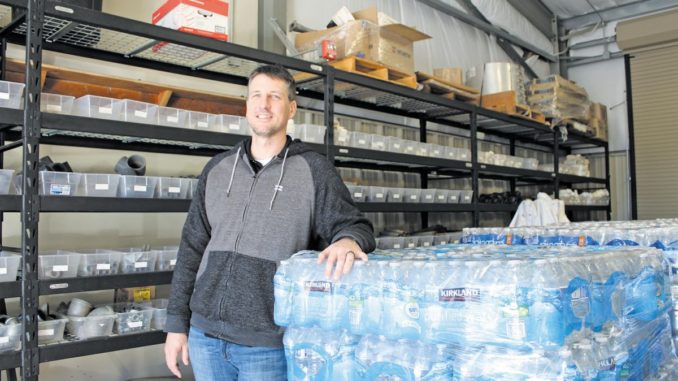
Kevin Phillips, district manager for Paradise Irrigation District, said an upcoming state study will examine multiple options for the district to remain solvent, including possibly bottling water for sale.
Butte County Water Commissioner Matt Tennis has been a vocal advocate for studying the feasibility of a water pipeline connecting Paradise to Chico. That advocacy landed him in the hot seat at the Board of Supervisors’ meeting Tuesday (March 10).
Supervisors Debra Lucero and Tami Ritter accused Tennis of a breach of trust and ethical lapses related to his work on a Butte County Water Commission subcommittee that has been tasked with presenting recommendations to the board regarding a potential intertie project connecting Paradise Irrigation District (PID) and California Water Service Co.’s Chico branch.
Lucero alleged that Tennis erred by sharing with a local business group last month a “nonpublic” draft resolution—a then-working document explaining the history of the intertie and potential impacts of such a pipeline—and failing to inform his fellow committee members about his presentation. Lucero brought the issue before the board to consider removing Tennis from the Water Commission.
“In my mind, he violated the process that was set out for the ad hoc committee,” Lucero said, adding: “Every commission or committee has the right to expect ethical and honorable conduct from its members.”
The allegations were the latest dust up surrounding the proposed pipeline. The water conveyance system has been described by advocates as one option that could help PID remain financially solvent as Paradise rebuilds following the Camp Fire and also curb groundwater pumping in the Chico area, thereby relieving stress on the basin (see “Taking on water,” Newslines, Dec. 19, 2019). The project ultimately may be examined in a pending sustainability study conducted by the state, which will review a wide range of options that could keep PID afloat.
On Feb. 18, Tennis presented a draft resolution to the Chico Chamber of Commerce’s Legislative Action Committee, from which he was seeking support. That presentation hit at the heart of objections from Lucero and Ritter, whose districts cover Chico.
Ritter accused Tennis of misusing his position as a water commissioner, suggesting he falsely represented the positions of the commission to further his personal advocacy in support of the pipeline project. She also highlighted statements made at Tuesday’s meeting by Paul Gosselin, director of the county’s Department of Water and Resource Conservation, indicating subcommittee members had been warned to not discuss their work with other commissioners. Gosselin further suggested more training regarding policies and procedures may be appropriate.
Supervisor Bill Connelly was unpersuaded by the accusations against Tennis, saying that unless there is a legal reason to keep matters confidential, public officials should strive to be as transparent as possible. He further said Tennis was protected under the First Amendment to share the draft document with the public.
“I think this is an overstep,” Connelly said of the attempt to remove Tennis, moving to dismiss the matter. The motion gained a second by Supervisor Doug Teeter, whose district includes the Ridge. The motion carried 3-2, with Lucero and Ritter dissenting. Chairman Steve Lambert, however, suggested that the board review policies relating to advisory committees at a future meeting “so we don’t have this situation ever again.”
For his part, Tennis said he believed he was subjected to a fair process at Tuesday’s meeting. He further noted an email sent to Lucero and Ritter by Katy Thoma, president and CEO of the Chico Chamber of Commerce. Thoma told the supervisors that Tennis “explicitly stated” he was not representing the Water Commission.
Tennis told the CN&R he believes he did a good job informing the chamber’s legislative committee on the topic, adding, “I wouldn’t change anything.”
At its meeting last Wednesday (March 4), the Water Commission adopted a final resolution recommending that the Board of Supervisors signal its support for the Paradise intertie project as one concept to be explored in the state’s upcoming sustainability study. The supervisors—though not being asked to commit any money toward the study—are expected to consider the commission’s recommendation in the coming weeks.
Kevin Phillips, PID’s district manager, laid out for water commissioners the scope of the state study, which has a budget of about $500,000 and will be facilitated through Sacramento State’s Office of Water Programs, a unit under the school’s nonprofit auxiliary University Enterprises. PID is required to participate in the study as a condition of accepting two years of “backfill” money from the state totaling about $14 million. The money has kept PID running after losing most if its customer base in the fire.
The study’s scope will be broad, Phillips said. It will explore multiple avenues for the district to remain viable as Paradise recovers, including the potential intertie project. It also will examine whether PID could bring more customers into its fold, such as those along the Miocene Canal corridor, who lost their water supply when the fire destroyed the upper portion of the canal owned by PG&E.
Other options could be on the table as well, the district manager said. Among the options: PID bottling water for sale, consolidating with private or public entities, and taking over the town’s sewer project. Phillips said the district has experience laying pipelines. He added that multiple projects could be identified as pieces in solving PID’s financial puzzle.
